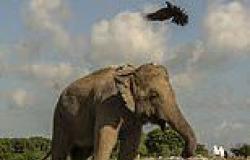
Wednesday 25 May 2022 02:49 PM Vet who caught monkeypox in 2003 says he suffered lesions all over his body trends now
A veterinarian who caught monkeypox in America's biggest ever outbreak nearly two decades ago says he suffered 'flu-like' symptoms and feared he'd lose his thumb after lesions erupted all over his body.
Dr Kurt Zaeske, who is now retired and living in Wisconsin, caught the virus in 2003 after tending to sick prairie dogs at a breeding farm.
The illness initially left him with a fever and feeling dizzy, nauseous and very tired all the time. Within a few days, small lesions erupted across his body, and a 'very painful' blister appeared on his thumb — leaving him fearing it could be amputated.
Doctors administered Zaeske with antibiotics after a positive test for monkeypox and he was put in self-isolation. The illness cleared up within a few weeks.
Zaeske detailed his harrowing experience to NBC, saying that suffering the tropical disease was 'scary' initially, but also 'fascinating' to be part of the outbreak.
Monkeypox is now sweeping the western world, with more than 221 cases detected in 24 countries — mostly in Europe — including up to eight in the United States.
But experts warn the outbreak of the disease — which is endemic to West Africa — was just waiting to happen as the end of smallpox vaccination drives in the 1970s have left people less than 50 years old with no protection against the virus.

Dr Kurt Zaeske, who is now retired and living in Wisconsin, said he caught the virus in 2003 while tending to infected prairie dogs imported from Ghana. Illness initially left him feeling dizzy before lesions erupted all across his body

The 2003 outbreak was the biggest experienced in the U.S. since records began. It was sparked after infected rodents were imported from Ghana, West Africa. They were then housed next to prairie dogs (pictured) which also became infected and spread the virus to humans after they were sold as pets
The U.S. faced its biggest ever outbreak of the tropical illness since records began in 2003, when a total of 47 people in six states caught the virus from infected prarie dogs.
Contact tracing revealed monkeypox had arrived in a shipment of more than 800 infected rodents imported from Ghana, in West Africa, to Texas.
The animals were housed next to a group of prairie dogs, to which they transmitted the virus. The animals were then sold as pets before they developed signs of infection.
Studies on the outbreak revealed people who





